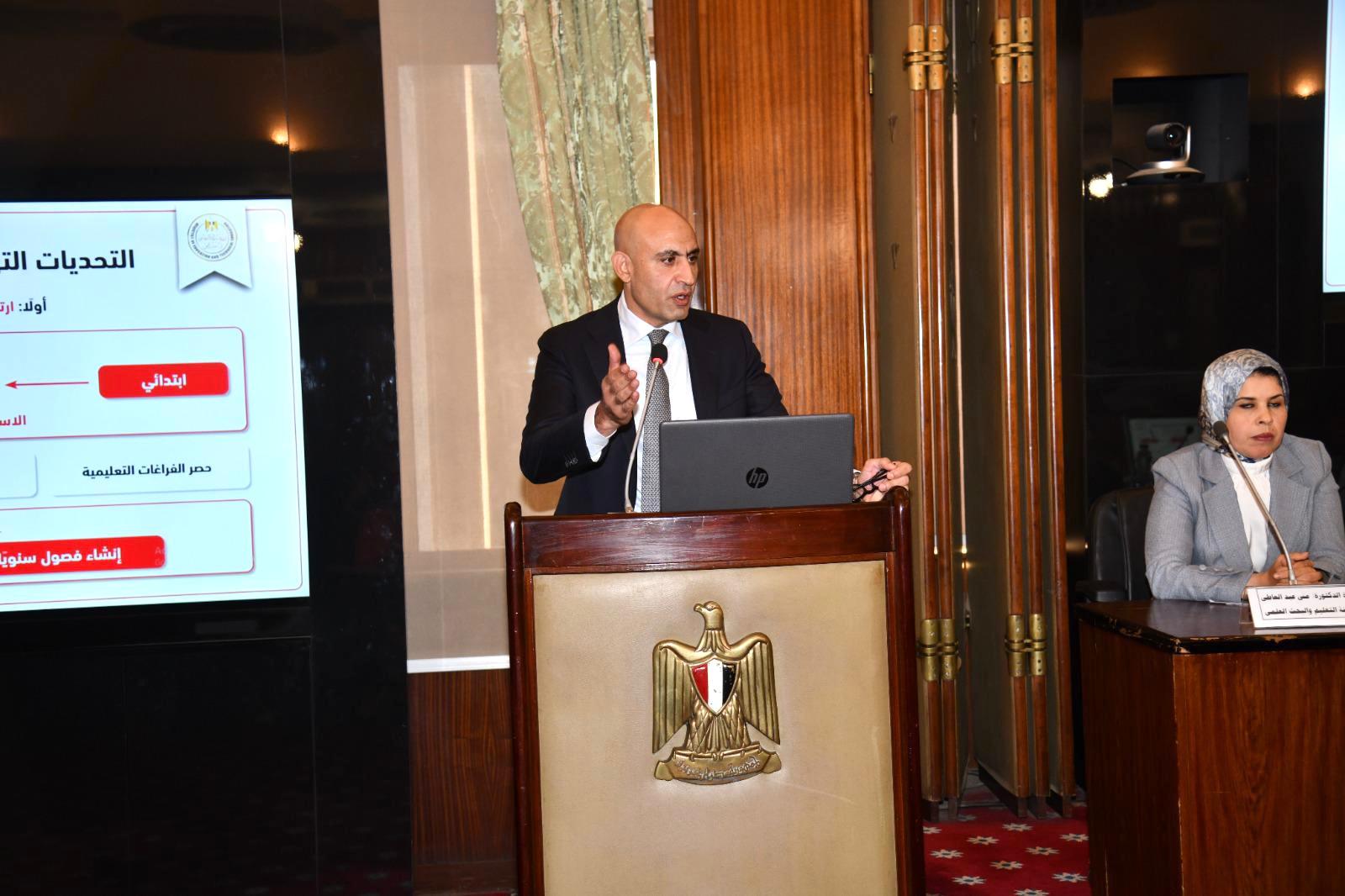The Minister of Education reviews the procedures, policies and interventions to overcome the challenges

Mr. Mohamed Abdel Latif, Minister of Education and Technical Education, participated today in a session of the Education, Scientific Research, Communications and Information Technology Committee of the House of Representatives, headed by Dr. Sami Hashem; to present and discuss his statement that he delivered before the Council last October, regarding the plans and policies of the Ministry to develop the educational system and enhance the quality of education.
The Education and Scientific Research Committee was attended by Dr. Magda Bakry, Dr. Mona Abdel Aati, the committee's deputies, and Dr. Amal Asfour, the committee's secretary.
The Ministry also included Dr. Ahmed Al-Mohammadi, Assistant Minister for Strategic Planning and Follow-up, Walid Maher, Director General of the General Administration of Political Communication and Parliamentary Affairs at the Ministry, and Shady Zalta, the media advisor and official spokesperson for the Ministry.
At the beginning of his speech, Minister Mohamed Abdel Latif praised the House of Representatives for its effective role in supporting the government to advance the educational process as a common issue that requires enhancing cooperation between all parties, praising the support of the honorable representatives for the educational process in all governorates.
During the session, the Minister reviewed an explanatory presentation of the challenges and problems facing the educational process, and the urgent procedures, policies and interventions that were implemented during the past period to confront these challenges.
The Minister confirmed that the Ministry succeeded in eliminating the problem of student density by 99%, reducing student density to rates of less than (50) students per class and creating new classrooms with (98,744) classes, and the problem of the deficit in the number of teachers, which represented (460) thousand teachers, was solved by 90%, in addition to the Ministry working to improve the job conditions of teachers.
The Minister added that the secondary school stage has been restructured to provide a good educational process within the school, in addition to addressing the challenges related to attracting students to school, to achieve an attractive and motivating educational process for students, as well as expanding the establishment and development of Egyptian-Japanese schools, and reformulating and developing curricula to provide students with the skills necessary for the labor market.
He also stressed that these procedures came as a result of many field visits to the governorates and meetings with directors of educational departments, school principals and teachers, in addition to reviewing these solutions by experts and the approval of the parties to the educational system, explaining that the solutions that were implemented during the past period were necessary and urgent to confront chronic challenges to ensure the discipline of the educational process in schools.
In response to the questions and inquiries of the representatives, members of the Education Committee, about the weekly evaluations, the Minister indicated that the evaluations within all educational systems represent an important factor in determining the level of students and following up on them, noting that there is no educational system in any country in the world that does not have a notebook and school assignments, adding that the Ministry is also working on a plan to support literacy among students in the early stages.
In response to questions about the teacher shortage, the Minister confirmed that the deficit has been covered by 90% through a number of mechanisms, including completing the presidential initiative to compete to appoint 30,000 teachers annually, providing the opportunity for classroom teachers to teach basic subjects, regularizing the status of education specialists (teaching specialists) with higher educational qualifications, providing the necessary financial appropriations to employ 50,000 teachers per hour in basic subjects, as well as hiring teachers per hour from teachers referred to retirement, in addition to hiring teachers per hour who have obtained an educational qualification.
The Minister also answered some questions about the measures implemented by the Ministry to ensure discipline and regularity of the educational process, and attract students to school, as the Minister explained that the annual work system has been implemented and controls have been set for it, in addition to implementing the educational incentive and school discipline regulations that define the responsibilities and duties of the teacher and the student, in addition to improving the physical environment of schools, and student activities in schools have been developed.
The Minister also explained, in response to some questions about the religious education subject, that the Ministry is currently coordinating with Al-Azhar Al-Sharif and the Church to develop religious education curricula so that both the Islamic religion book and the Christian religion book include common moral values and principles with the aim of teaching religion with a moral concept that reflects on consolidating these values in society.
With regard to the efforts to develop technical education, the Minister confirmed that the Ministry is completing the plan to develop technical education and advance the organization through several axes, whether in relation to applying the competencies methodology in technical education schools or through applied technology schools, which have achieved great success and witnessed an increase in demand for them, as they provide job opportunities for graduates inside and outside Egypt, noting that the Ministry is working to increase the number of applied technology schools and expand them throughout Egypt.
The honorable representatives appreciated the efforts of the Minister and the decisions that have been taken in order to develop the educational process and find urgent solutions on the ground, especially with regard to the axis of eliminating student density and discipline of the educational process within schools.
